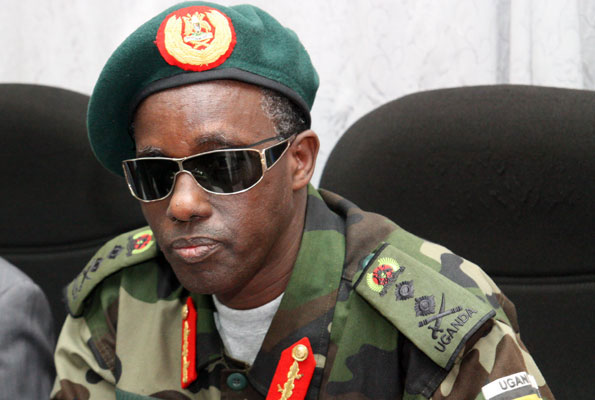Dr. Okasai Opolot making his submission at the CERAWEEK in Houston, Texas, USA
Uganda says the west should allow emerging oil-producing countries in Africa to extract their resource amidst the energy transition debate.
Energy transition refers to the global energy sector’s shift from fossil-based systems of energy production and consumption — including oil, natural gas and coal — to renewable energy sources like wind and solar, as well as lithium-ion batteries.
An international agreement signed at the UN Climate Change Conference of Parties also known as COP-21 in Paris in 2015, set the target of limiting global warming by the end of this century to below 2 degrees Centigrade (2°C) compared with pre-industrial levels and preferably limiting it to 1.5 degrees Centigrade (1.5°C).
A similar conference held in Glasgow (COP-26) in November last year confirmed the commitment to achieve carbon neutrality by 2050. But in order to achieve this goal, there is a call to phase out fossil powered vehicles in favour of electric ones. While it has been globally accepted that the Energy transition holds key to tackling global energy and climate crisis, there is debate whether countries like Uganda should leave its recently discovered oil and gas resources in the ground.
That debate continued at the CERAWeek annual energy conference organized by the information and insights company IHS Markit. The conference held in Houston, Texas- USA attracted hundreds of energy industry executives and governmental officials, not only from the United States but from a number of countries.
State Minister for Energy, Okaasai Opolot Sidronius led Uganda’s delegation which included Petroleum Authority of Uganda’s Executive Director, Earnest Rubondo and officials from Uganda National Oil Company. Delegates to the conference discussed the challenges, opportunities, and pace of change around energy, climate, technology and innovation.
During the meeting, Dr Okasai observed that the Energy transition debate must be contextualized to cater for the needs of the African continent. He suggested that Africa should be allowed to sustainably exploit their oil and gas.
“We think that Africa needs special treatment through the provision of financing, technology and capacity building aimed at sustainable exploitation of its energy resources including fossil fuels while striving to minimize emissions,” Okaasai said.
He says Uganda needs to use its oil and gas resources to develop but as well as ensuring that the environment is protected. “In View of climate Change….. Cue Out….and doing it well”///// Houston Texas where the Minister was speaking has been dubbed as the Energy Capital of the World. Houston is the headquarters and the intellectual capital for virtually every segment of the energy industry including exploration, production, transmission, marketing, supply, and technology. Dr. Okasai says Uganda can borrow latest technologies from Houston to enable it to sustainably develop oil and gas in the Albertine. //// Cue In “This is where we …….. in developing petroleum in Uganda”//// Asked about what the energy transition means to Uganda, Dr. Okasai insisted that its implementation should be phased so that the country extracts its oil and gas as it prepares to shift. /////Cue In “ What it means to Uganda…… Cue Out….. do we have in getting that”/////
The Directorate of Petroleum says Uganda’s oil resources volume has been increasing right from 2006 when commercial oil was discovered in the Albertine. It is estimated there are 6.5 billion barrels with about 1.4 billion barrels determined to be recoverable (or producible) commercially by using currently available technology.
As international oil companies move towards planned production by early 2021, some have expressed fear that the country’s oil will not have a market amidst the shift from fossil fuels. As oil companies move into putting in place the required infrastructure for production, the government expects much more investment, in the range of 15-20 billion dollars.
Uganda and other African countries with oil and gas resources have been using conferences like the one that has just ended in Houston to call for technologies for sustainable extraction of oil. Dr Okasai appealed to investors to bring in technology that can be used to effectively develop the abundant renewable energies in the country.
“Uganda is a clean energy country, and is making effort to deliver electricity, which is one of the clean energy sources to rural areas”, he said, “the region is well endowed with enormous natural resources such as hydro, geothermal, petroleum resources, wind, and solar energy, among others, yet only a small fraction of this potential has been developed,” he added
According to a Petroleum Authority statement, the key outcomes of this conference included the need for continued and accelerated exploration and production of oil and gas resources to guarantee energy security especially since the world is currently experiencing a shortage of energy, the need to develop technologies to capture and store carbon arising from some energy sources, especially fossil fuels and the need to gradually transition into renewable energy such as hydrogen, solar and nuclear energy, among others.
TotalEnergies Chairman Patrick Pouyanne reportedly confirmed the availability of funding for its oil and gas projects in Uganda, during the event, especially after the announcement of the final investment decision for Uganda’s oil and gas projects on February 1, 2022.





